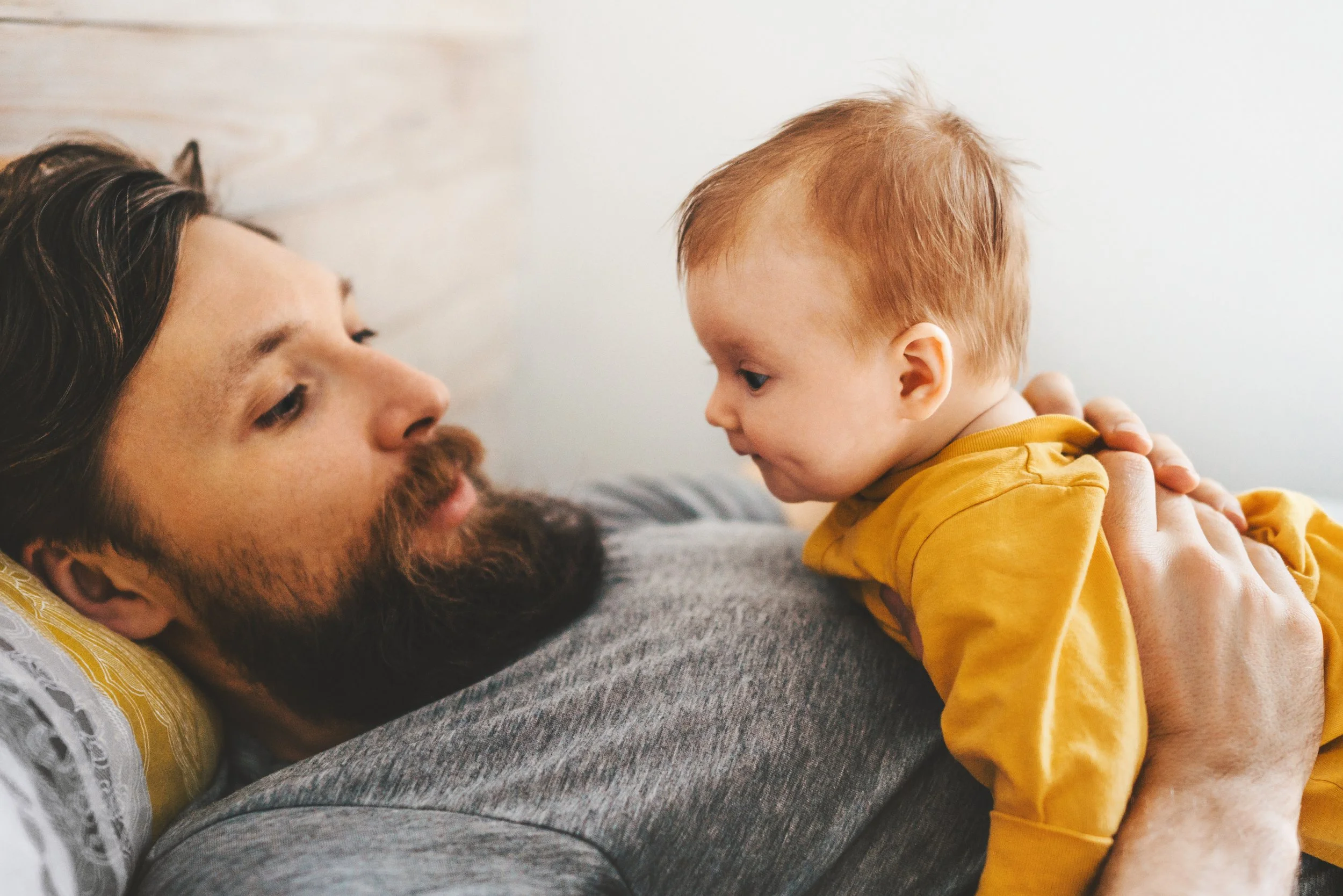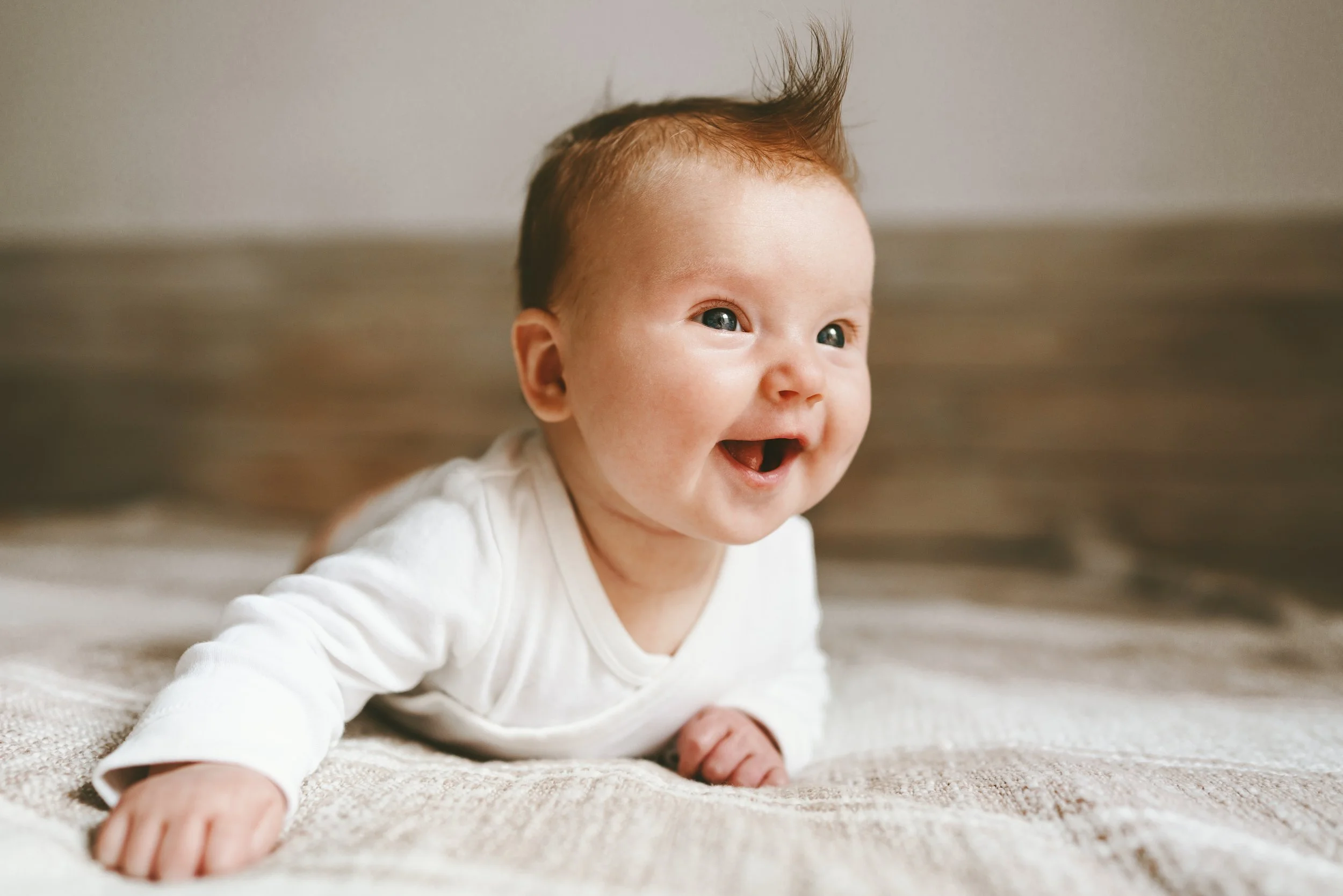When do babies start cooing?
A young baby and their dad are playing on a blanket on the floor. The dad sings to the baby while shaking some toys. The baby smiles, wiggles, and says “oooooh!” The baby has made sounds before (crying, laughing, making raspberries), but this was new. The baby has cooed! The dad smiles and says, “oooh!” back.
Hearing a baby coo is an exciting and anticipated moment for parents. It is the first time that a baby makes a sound that sounds like “talking.” Babies coo because they love to hear their own voice. They’ve heard their caregivers talking and are motivated to make sounds too.
What is cooing?
“Cooing” is a word for the early baby sounds that infants make. Babies can turn their voices on to cry from birth, but cooing is the first time a baby might make sounds that isn’t crying or laughing.
Cooing can best be described as sounding like vowel sounds. It might be short pulses of sounds (like “ah ah”) or long (“oooooh”.)
When do babies start cooing?
Babies start cooing around 6-8 weeks of age. This might be different if the baby was born early.
Is babbling the same as cooing?
Although babbling and cooing are both baby sounds, they are not the same thing. Cooing comes first and is made of easy vowel-like sounds (“ah ah ah.”) Babbling is a little more complicated and will combine a consonant sound with a vowel (like “ga ga ma ma.”)
How do I encourage baby sounds like cooing?
Babies learn from watching the world around them and are especially engaged with their caregivers. To help your baby learn to make sounds, spend lots of time face to face with your baby.
Speak and sing to your baby throughout the day. It doesn't matter what you are talking about or if you are a good singer- your baby loves you and the sound of your voice no matter what.
Making sure your baby sees your face and hears your voice will give them a chance to try to copy you and make sounds too.
When should I be worried about baby sounds?
If a baby isn’t cooing by 3-4 months of age or isn’t babbling by 6 months of age, it is important that this concern be brought up to the child’s pediatrician.
The pediatrician might suggest a baby hearing test and check on the child’s overall development.
What baby milestones come after cooing?
After a baby learns to coo by 2 months of age, they will start to make some consonant sounds, like “mmm” or “ppp” by 4 months.
The babbling will start simple and be the same sound repeated over and over (“ma ma ma.”) After a while the babbling will start to sound more complicated (“ma ma ma buh buh”) and then even more complicated (“ba de gah.”)
Here are some other common questions parents ask about cooing:
-
It is unlikely that a baby will coo at three weeks. Babies usually start cooing at 6-8 weeks. However, young babies quickly develop different crying sounds that mean different things (hungry, tired, hurt, etc.) that parents will be observing by 3 weeks of age.
-
Babies develop a coo first around 2 months of age. They start babbling later, by about 4 months of age.
-
Cooing is more simple and comes earlier while babbling is a little more complicated. Cooing will sound more like simple vowel sounds (“ahhhh”) and babbling will contain consonant sounds next to vowel sounds (“ma ma ma.”)
-
If your baby is not cooing by 4 months of age, you should consider discussing this with your pediatrician. The pediatrician will likely ask about other milestones and may suggest a hearing test.
Written By: Stephanie Burgener-Vader, MA, CCC-SLP
References:
American Speech-Language-Hearing Association. (n.d.). Birth to one year. American Speech-Language-Hearing Association. Retrieved October 12, 2022, from https://www.asha.org/public/speech/development/01/
Hearing & making sounds: Your baby's milestones. HealthyChildren.org. (n.d.). Retrieved October 12, 2022, from https://www.healthychildren.org/English/ages-stages/baby/Pages/Hearing-and-Making-Sounds.aspx
Infant cooing, babbling linked to hearing ability. (2014). The ASHA Leader, 19(12), 14–14. https://doi.org/10.1044/leader.rib1.19122014.14
Nelson, N. (2010). Language and literacy disorders: Infancy through adolescence. Pearson Education, Inc.
© 2020-2025. Stephanie Keffer Hatleli, MS CCC-SLP. All Rights Reserved.
The content offered on ToddlerTalk.com is for informational purposes only. Toddler Talk is not engaged in rendering professional advice, whether medical or otherwise, to individual users or their children or families. No content on this site, regardless of date, should ever be used as a substitute for direct medical advice from your doctor, speech language pathologist, or other health professional. By accessing the content on ToddlerTalk.com, you acknowledge and agree that you are accepting the responsibility for your child’s health and well-being. In return for providing you with information related to home speech and language practice, you waive any claims that you or your child may have as a result of utilizing the content on ToddlerTalk.com.




